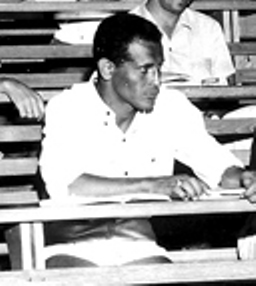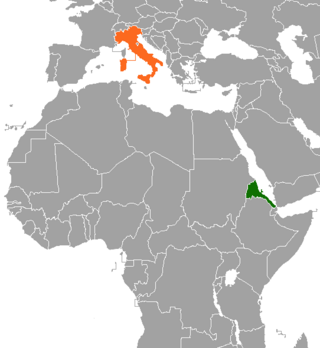
Eritrea is an ancient name, associated in the past with its Greek form Erythraia, Ἐρυθραία, and its derived Latin form Erythræa. This name relates to that of the Red Sea, then called the Erythræan Sea, from the Greek for "red", ἐρυθρός, erythros. But earlier Eritrea was called Mdre Bahri. The Italians created the colony of Eritrea in the 19th century around Asmara and named it with its current name. After World War II, Eritrea annexed to Ethiopia. Following the communist Ethiopian government's defeat in 1991 by the coalition created by armed groups notably the EPLF, Eritrea declared its independence. Eritrea officially celebrated its 1st anniversary of independence on May 24, 1993.

The 1962 African Cup of Nations was the third edition of the Africa Cup of Nations, the football championship of Africa (CAF). It was hosted by Ethiopia. Nine countries entered the competition, including the reigning champions Egypt, meaning for the first time a qualification tournament was required. The finals only included four teams. Egypt, as holders, and Ethiopia as hosts, qualified automatically meaning each needed to play only one game to reach the final. Ethiopia won the tournament for the first time, defeating UAR 4–2, after extra time in the final.
The 1965 African Cup of Nations was the fifth edition of the biennial African association football tournament organized by the Confederation of African Football (CAF) hosted in Tunisia from 12 and 21 November 1965. This was the final edition of the tournament to be held in an odd-numbered year before 2013. The growing enthusiasm for the competition and the increasing number of participating teams led to an increase in the number of participants in the tournament, which rose from four to six teams.
The 1968 African Cup of Nations was the sixth edition of the Africa Cup of Nations, the association football championship of Africa (CAF). It was hosted by Ethiopia. The field expanded to eight teams, split into two groups of four; the top two teams in each group advanced to the semifinals. Congo-Kinshasa won its first championship, beating Ghana in the final 1−0.
Cicero Stadium is a multi-purpose stadium in Asmara, Eritrea. With a capacity of 10,000, it is currently used mostly for association football matches.
Mengistu Worku was an Ethiopian footballer, recognised as one of the best Ethiopian footballers in history with Luciano Vassalo and Yidnekatchew Tessema. He is best known for his role in the final of the 1962 African Nations Cup, and for being the head coach to take the Ethiopia national team to the African Nations Cup in Libya in 1982.

{{Infobox football biography | name = Luciano Vassallo | image = Luciano Vassallo 1968.jpg | caption = Vassallo in 1968 | full_name = | birth_date = 15 August 1935 | birth_place = Asmara, Italian Eritrea | death_date = 16 September 2022 (aged 87) | death_place = Ostia, Italy | height = | position = Midfielder | youthyears1 = 1950–1952 | youthclubs1 = Stella Asmarina | youthyears2 = 1952–1953 | youthclubs2 = Ferrovieri Asmara | years1 = 1953–1958 | clubs1 = GS Gejeret | years2 = 1958–1960 | clubs2 = Asmara Calcio | years3 = 1960–1973 | clubs3 = Cotton Factory Club | nationalyears1 = 1960–1971 | nationalteam1 = Ethiopia | nationalcaps1 = 104 | nationalgoals1 = 47 | manageryears1 = 1968–1973 | managerclubs1 = Cotton Factory Club | manageryears2 = 1969–1970 | managerclubs2 = Ethiopia | manageryears3 = 1974 | managerclubs3 = Ethiopia | manageryears4 = 1974 | managerclubs4 = Saint George | manageryears5 = 1975 | managerclubs5 = Air Force FC | manageryears6 = 1976 | managerclubs6 = EEPCO F.C. | manageryears7 = 1978 | managerclubs7 = Ethiopia | medaltemplates = {{Medal|Country|{{|ETH}}}} |- ! Men's football |- ! Africa Cup of Nations |- | Winner| 1962 Ethiopia| }}
Football is the most popular sport in Eritrea. After being under Ethiopian control, Eritrea gained its independence in 1991 and in 1998 the country became a member of FIFA.

Italian Eritreans are Eritrean-born citizens who are fully or partially of Italian descent, whose ancestors were Italians who emigrated to Eritrea during the Italian diaspora, or Italian-born people in Eritrea.
Tekle Kidane is a former football player. In his early days, Tekle played among the best international (Ethiopian) football players with former Ethiopian national team.

Italian Eritrea was a colony of the Kingdom of Italy in the territory of present-day Eritrea. The first Italian establishment in the area was the purchase of Assab by the Rubattino Shipping Company in 1869, which came under government control in 1882. Occupation of Massawa in 1885 and the subsequent expansion of territory would gradually engulf the region and in 1889 the Ethiopian Empire recognized the Italian possession in the Treaty of Wuchale. In 1890 the Colony of Eritrea was officially founded.
Association football is the most popular sport in nearly every African country, and thirteen members of the Confederation of African Football (CAF) have competed at the sport's biggest event – the FIFA World Cup.

Italians of Ethiopia are Ethiopian-born citizens who are fully or partially of Italian descent, whose ancestors were Italians who emigrated to Ethiopia starting in the 19th century during the Italian diaspora, or Italian-born people in Ethiopia.

Mohamed Badawi Abdel Fattah, better known as Badawi Abdel Fattah, was an Egyptian former footballer who played as a midfielder for the Egyptian national team. He took part in the 1962 Africa Cup of Nations, and was the tournament's joint top scorer. He also represented his country in the 1964 Summer Olympics.
This is a list of records and statistics of the Africa Cup of Nations.
Tele SC Asmara is an Eritrean football club based in Asmara. The team -usually called "Tele S.C."- is a member of the Eritrean Football Federation national league.
The 1962 African Cup of Nations Final was a football match that took place on 21 January 1962 at the Hailé Sélassié Stadium in Addis Ababa, Ethiopia, to determine the winner of the 1962 African Cup of Nations, the football championship of Africa organized by the Confederation of African Football (CAF).

Eritrea–Italy relations are the bilateral relations between Italy and Eritrea. Both nations are members of the United Nations.

The Italo-Ethiopian War of 1887–1889 was an undeclared war between the Kingdom of Italy and the Ethiopian Empire occurring during the Italian colonization of Eritrea. The conflict ended with a treaty of friendship, which delimited the border between Ethiopia and Italian Eritrea but contained clauses whose different interpretations led to another Italo-Ethiopian war.
Ali Sulieman Ibrahim is an Eritrean professional footballer who plays as a forward for Ethiopian Premier League club Hawassa City and the Eritrea national team.








